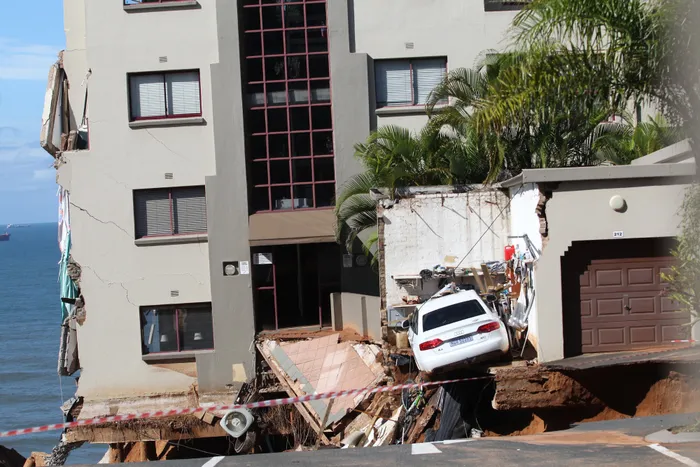eThekwini: An example of local government paralysis and governance challenges

The 2022 floods in KwaZulu-Natal laid bare a systemic crisis reflecting how on average, says the author.
Image: File
The 2022 floods in KwaZulu-Natal laid bare a systemic crisis reflecting how on average, any South African city will be found wanting should such a disaster reoccur. Within a matter of days, heavy rains left 448 people dead, displaced over 20 000 households and caused massive infrastructure. eThekwini Metropolitan Municipality became a national case study in how climate-driven disasters collide with governance challenges. In the aftermath of the calamity, a recent report by the Presidential Climate Commission (PCC) shows that the impact of the floods was magnified by chronic underinvestment, historical inequalities, and a lack of enforcement of municipal legislation, policies and by-laws in eThekwini. The report was written to assess changes that have been made by the city following the 2022 floods, to plan for future such disasters.
The report found that eThekwini has able and committed individuals in its employ and is relatively advanced in the development of climate and disaster management policies. The Durban Climate Change Strategy (DCCS), the Climate Change Resilience Strategy, and the Disaster Risk and Response Management Plan provide a fairly holistic framework that many South African cities lack. Additionally, the city has used innovative nature-based and engineering initiatives like the Transformative River Management Programme (TRMP), the Community-Based Flood Early Warning System (CBFEWS) and conservation of the Durban Metropolitan Open Space System (D’MOSS). These projects have dual-benefits of adaptation and resilience-building, and community integration.
A paralysis of poor policy Implementation
However, despite these clear frameworks and projects, the city like many municipalities often finds itself unprepared for extreme weather events.
There are critical enforcement gaps, where planning regulations and by-laws exist but are ignored by residents in building and extending both formal and informal structures. Without requisite enforcement, communities, particularly those impacted by the city’s substantial housing backlog, erect houses and other structures on riverbanks and unstable land. Even formal developments violate planning and zoning rules by erecting structures or making extensions to existing structures without the obtaining permission from the city.
Central to eThekwini’s challenges lies systemic governance, chronic underfunding, a disjoint between political and administrative decision-making, and weak accountability – the story of many of our local government structures. While many in the country suffer from similar challenges, a disproportionate impact on eThekwini exists due myriad factors including the high population, frequency of flooding, and location of the country’s largest seaport.
An Overstretched Department with structural Inequalities
The blame for poor disaster responses often falls at the feet of the Disaster Management Department in the city. Communities and civil society organisations view the department with scepticism, describing disaster management officials as absent, defensive, and dismissive of community knowledge. In some cases, communities have created their own risk-reduction strategies, not trusting the local department to assist them when needed. However, with a staff complement of just 14, eThekwini’s capacity is dwarfed by comparable metros. During crises, staff reportedly work without breaks, sleep in cars or work through illness. The result is not only operational failure, but a collapse in community trust.
eThekwini battles with socio-economic challenges that includes inequality, unemployment and a significant housing backlog. Apartheid spatial planning patterns still exist in much of the city, with the most vulnerable people choosing to settle in dangerous areas because of the proximity to employment or economic opportunities. One-quarter of residents of the city live in an informal settlement. These factors make resilience-building difficult and relocation efforts are unsuccessful if done without regard for the distance from the city as it forces families back into high-risk zones near jobs and services.
Systemic Challenges
The eThekwini case is not just about one city’s failures and innovations; it is a diagnostic tool for how local governments, especially in climate-vulnerable regions, can build resilience. Policy design must be matched by implementation, enforcement and accountability. Governance systems are essential to improved local government performance, particularly with increased disasters predicted and the imminent implementation of the Climate Change Act. However, national government cannot expect local government to discharge an ever-increasing mandate without resources – financial and human. Mandates must be fully funded, and budgets must align with staffing requirements.
Climate mainstreaming is essential for local government functioning, especially since the effects of climate change are increasing faster than expected. Durban has climate change strategies, but they are not consistently embedded into the work of other departments. Mitigation and adaptation are equally important for cross-departmental integration. In this area and other departments, community knowledge and engagement is essential. Communities are co-producers of resilience, not passive beneficiaries and participatory planning, local knowledge integration, and trust-building are essential.
As climate impacts intensify, paralysis is no longer an option. Municipalities must be equipped with the funding, staff, and authority to act decisively. National government, in turn, must ensure mandates are fully resourced and adequate support provided. Communities must be engaged as partners, not afterthoughts. Only then can local governments shift from being the weakest link in disaster response to the strongest foundation of climate resilience.

Yuri Ramkissoon, Senior Manager Monitoring and Evaluation at the Presidential Climate Commission.
Image: Supplied
Yuri Ramkissoon is a Senior Manager: Monitoring and Evaluations at the Presidential Climate Commission
*** The views expressed here do not necessarily represent those of Independent Media or IOL.
BUSINESS REPORT